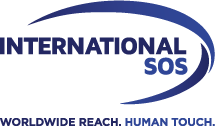Health issues on the rise for business travellers increased risk in a changing world
London
• Over 40% of medical cases occurred in countries classed as ‘high’ or ‘extreme’ risk
• This is a sharp increase from less than 25% in 2010
• Many costly medical cases in ‘extreme risk’ countries potentially preventable
A growing number of business travellers and expatriates are being sent to countries with higher medical risks, and more of them are requiring medical assistance than ever before. International SOS medical case data from 2013 shows our members are working and living in increasingly risky locations and need to consider planning and preparing accordingly.
International SOS Medical Director - Medical Information, Dr Irene Lai said:
“Our message is clear. If you haven’t thought about preparing your travellers and don’t already have programmes in place to do so, the time to act is now.
Many hospitalisations and medical evacuations are due to preventable causes such as injuries and cardiovascular problems and the risk of evacuation is related to the medical risk at the destination. Preparation of travellers, including a risk assessment, education and health check programme for staff, will reduce the need for intervention after travel. This is especially important for those travelling to high and extreme risk countries. Potentially such preparation can have a positive impact on business continuity. If companies are not proactively managing the health of their travelling staff prior to deployment, they are running the risk of failed assignments, preventable costs, litigation, or even a tragic outcome.”
Key findings from 2013 – data from approximately 600,000 medical cases in 2013
Global
• Over 40% of medical cases occurred in countries classed as ‘high’ or ‘extreme’ risk - a sharp increase from less than 25% in 2010.
• Looking at medical cases by type, heart disease ranks number 5 for men but isn’t in the top ten for women.
• 11% of medical cases in extreme countries are due to cardiovascular disease, while another 11% can be attributed to infectious illnesses including malaria and dengue fever. Many of these cases could be prevented through pre-deployment programmes such as screening for heart disease, or education on preventing mosquito-borne infections.
• As in previous years, injuries, respiratory and gastrointestinal problems are the three most common reasons that our members will contact us for medical assistance.
Asia and Middle East
• 50% of cases in Asia and the Middle East are in ‘high’ risk countries with assistance most commonly required in Indonesia, India, China and Vietnam. This compares with 29% in 2010.
Other regions
• Africa continues to be without any countries classed as ‘low risk’. The combined share of medical cases in high and extreme risk countries has increased since 2010, from 78% to 85%.
• In medical terms Europe remains a largely low risk continent. Nevertheless, members still require medical assistance in low risk areas. A greater proportion of people (87%) are contacting us from low risk locations, whereas in 2010 the figure was 59%.
• Medical cases by risk category in the Americas are generally at similar levels to 2010. The number of cases in extreme risk countries has decreased slightly.
• The number of medical cases in higher risk Oceania countries has increased over the last 4 years, from 14% in 2010 to 25% in 2013.
Our travellers
• The number of male and female adults under 40 who seek our help prior to, or during, travel is the same. However over the age of 40, the number of men who call us for medical assistance is more than double the number of women.
• Men are more likely to be injured than women whilst overseas. They are also more likely to have a cardiovascular event (such as a heart attack) or suffer from insect-borne diseases such as malaria and dengue fever.
The data analysis mirrors recent research from International SOS which shows:
• Nearly 50% of travellers and expatriates hospitalised in a high risk country will require a medical evacuation.
• In an extreme risk country, that figure rises to nearly 80%.
• Only 32% of the 628 organisations surveyed by the International SOS Foundation conduct person/location risk assessments prior to expatriate assignments.
~~Ends~~
Notes to Editors
About the International SOS Group of Companies The International SOS Group of Companies is in the business of saving lives, protecting your global workforce from health and security threats. Wherever you are, we deliver customised health, security risk management and wellbeing solutions to fuel your growth and productivity. In the event of extreme weather, an epidemic or a security incident, we provide an immediate response providing peace of mind. Our innovative technology and medical and security expertise focus on prevention, offering real-time, actionable insights and on-the-ground quality delivery. We help protect your people, your organisation's reputation, as well as support your compliance reporting needs. By partnering with us, organisations can fulfil their Duty of Care responsibilities, while empowering business resilience, continuity and sustainability. Founded in 1985, the International SOS Group, headquartered in London & Singapore, is trusted by 12,000 organisations, including the majority of the Fortune 500, as well as mid-size enterprises, governments, educational institutions and NGOs. 12,000 multicultural medical, security and logistics experts stand with you to provide support & assistance from over 1,000 locations in 90 countries, 24/7, 365 days.
To protect your workforce, we are at your fingertips: www.internationalsos.com










